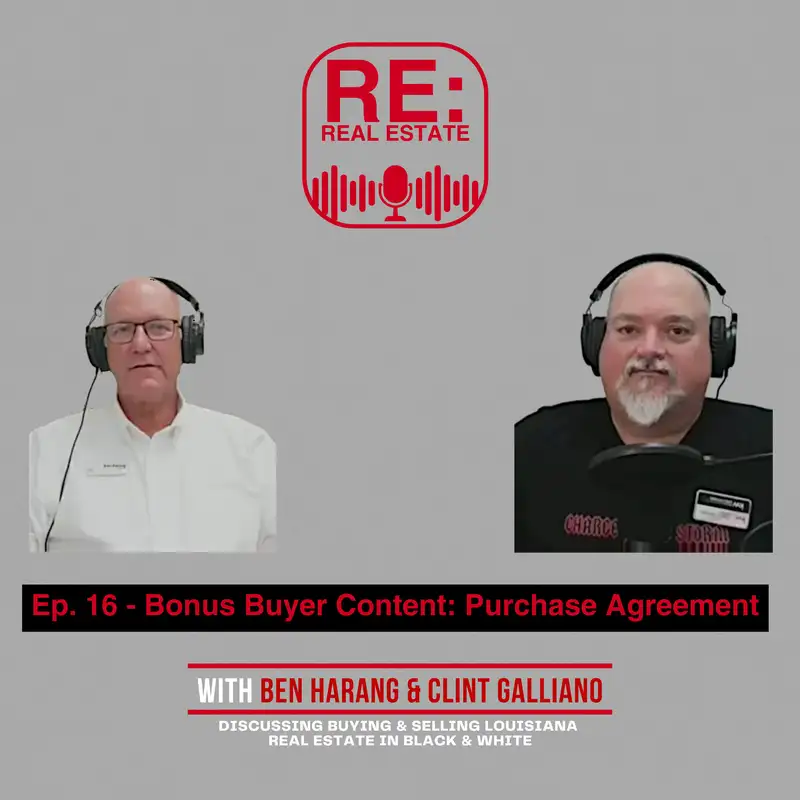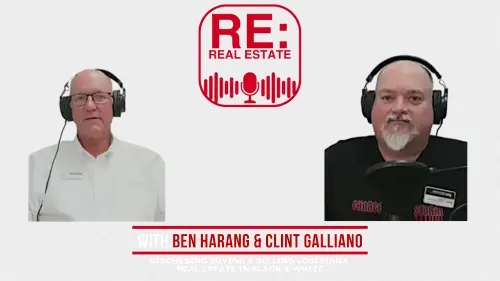Ep. 16 - Bonus Buyer Content: Purchase Agreement
Ben Harang (00:32)
Hey, Clint, how you doing today?
Clint C. Galliano (00:35)
I'm doing wonderful, Ben. How you doing?
Ben Harang (00:37)
I'm doing terrific man on a Friday afternoon, sunshine and cold weather's not here yet but it's coming. Life is good.
Clint C. Galliano (00:47)
Indeed indeed. I'm liking the cold weather. I'm in shorts and a t-shirt today so I'm you know this sounds very deja vu-ish.
Ben Harang (00:56)
Yeah, we talk about real estate in black and white and here we are, I'm in white, you in black. So let's talk about the purchase agreement.
Clint C. Galliano (01:02)
Indeed.
Ben Harang (01:05)
an 11 page purchase agreement that we're mandated to use by the Louisiana real estate commission. And it's basically a guideline to make sure nothing's left out and it kind of covers everything. Kind of starts off with the purchase price, obviously. And if you don't put much thought into the offer itself, it can come back to bite you.
with timelines and things. it just, you need to have a good idea of what kind of offer you want to submit before you actually put it in writing. And I know you have some thoughts on some specifics.
Clint C. Galliano (01:52)
Yeah, I mean, crafting the offer is what we're talking about here. It really depends on the situation and the buyer's goals. If the buyer has cash on hand and they're trying to get the best deal, then they can...
write an offer that doesn't ask for anything from the seller and maybe is significantly below the asking price. And if they're offering cash, then that maybe they can close in two weeks or less. And that may be advantageous.
Ben Harang (02:45)
Mm-hmm.
Clint C. Galliano (02:48)
to that buyer because it could be a situation where the seller wants to hurry up and move out of there. A lot of times cash doesn't really transact differently than finance sales other than the time it takes to go through with it.
because the seller needs to buy their house to move into. And so it doesn't matter if they can close on the house they're selling right away. It won't make them close on the house they're buying any faster. Plus they have to find a place to stay in the meantime unless they've got that already lined up. So go ahead.
Ben Harang (03:23)
Mm-hmm.
Right,
well, I'm just, things like whether the house is vacant or not could dictate how fast the seller is able to close. You know, the buyer may be able to close quickly, the seller may not be able to close quickly. If they're already out of the house for whatever reason.
the seller probably could close quickly and may be enticing to them rather than waiting the 45 or 60 days it would take for financed sale. So that's part of the consideration when you are crafting the offer is the motivation of the buyer as well as the motivation of the seller from a time standpoint.
Clint C. Galliano (04:17)
Yeah, a lot of things get taken into account as far as what we've talked about so far as far as what the motivation is.
the type of purchase, if it's going to be a cash sale, if it's going to be a finance sale, what type of financing? Is it going to be a conventional loan? Is it going to be a VA loan? Is it going to be an FHA loan or a rural development? Those all have different criteria that you have to pay attention to. A lot of buyers that are able to qualify or at least get a pre-approval for a loan.
don't necessarily have the cash sitting around to cover closing costs and down payments if the loan type that they're using requires a down payment. And so if they are, then they likely will be asking for concessions from the seller to pay for those closing costs.
So that that reflects back on what this offer strategy is going to be as far as if we're trying to get the best price or if we're trying to You know, Say, okay. Well, if we're gonna be asking for a bunch of money Maybe we want to consider offering a little bit more to make it more enticing to the seller Then what what you your best actual price that you'd like to pay for the house?
Ben Harang (05:49)
Mm-hmm.
Right. And we oftentimes get caught up on the price. But sometimes price is not the biggest factor. Sometimes it is. Excuse me, it is timing. It is about the type of loan that they're getting and how much cash they have on hand and the seller's motivation. so we a lot of times we get caught up on the pricing, but sometimes it's
the convenience is more important than the pricing and when I speak to new agents I recommend to them learn how to complete a purchase agreement and complete it accurately and completely because there's not much worse than getting a purchase agreement that I forgot to check off the loan type but just it's going to go conventional and we'll change it if we have to to FHA. No that's
That's part of the agreement. So get it right the first time. Take a little longer and talk to the loan officer and do what needs to be done so you can complete it properly and have a chance to get it accepted.
Clint C. Galliano (07:16)
Yeah, because if you come in and check off that you are doing a VA loan and you want 12 % closing costs, the listing agent's probably going to look at that and go there out of their mind. And that agent doesn't know what they're doing. And they're going to tell their seller that.
Ben Harang (07:36)
Mm-hmm.
Right.
Clint C. Galliano (07:42)
and that seller is going to say, well, if they don't know what they're doing, there's probably not a good chance that they are going to be able to close this loan and close this transaction. So yeah, I'm going to reject that.
Ben Harang (07:54)
Well, that's generally what happens, but the cleaner you can write it, the more accurately you can write it. Don't ask for more closing costs than you actually need either. Even if the loan product allows it, FHA will allow up to 6 % paid by the seller for buyer or seller concessions.
Sometimes it's 4 % and it doesn't take 6%. So if you ask for 6 % and you only end up needing 4%, then the offer is actually 2 % better than you're representing it to be to the seller. So if you can be accurate, you still have a better chance of it accepted.
Clint C. Galliano (08:42)
Yeah. That's actually one of my pet peeves is not filling out the purchase agreement properly. Because I mean, accuracy.
Ben Harang (08:50)
Mm-hmm.
Clint C. Galliano (08:59)
I'm all about it being accurate, but it can also bite you in the butt.
Ben Harang (09:03)
Mm-hmm.
You know, one of the last statements on the purchase agreement is this is a legally binding contract. If it's not understood, seek competent legal advice. So if you're to enter into a legally binding contract, all the I's ought to be dotted and the T's ought to be crossed to give yourself the best chance to be able to buy the house that you want.
Clint C. Galliano (09:31)
Yeah, because if.
If you don't have the right information, it's a train wreck. mean, there's a section on the purchase agreement where you can have other terms and conditions. And I can tell you a story about something that I saw happen with another agent.
Ben Harang (09:46)
Mm-hmm.
Clint C. Galliano (10:05)
where they...
they put where they seller would transfer the flood insurance.
but then they didn't follow up and make sure that the flood insurance was transferred. And they thought about it in the closing. And by the time they got to closing, it was too late for the insurance company to transfer the flood insurance. And so that flood insurance policy was pretty much moot because they couldn't do anything about it.
Ben Harang (10:37)
Wow,
it was too late. Yeah, that's not good. You know, but it's things like that. It's things like that that.
Clint C. Galliano (10:40)
Yep.
You know, so those are.
Those are the things that you want to put
in, you know, like other terms and conditions, you know, like getting a wood destroying insect report, transferring the balance of the flood insurance policy to the buyer, transferring the termite contract, things like that. Those are the things that you want to document and make sure is in there and that everybody's aware of it so that you're not sitting there, well, I thought this or I thought that.
you know, even so far as to spell out, you know, leave the range, leave the microwave, you know, things like that, even though they're considered installed appliances, unless it's like a tabletop microwave or something.
Ben Harang (11:35)
Yeah.
Clint C. Galliano (11:37)
It's supposed to stay in there based on the verbiage of the purchase agreement, but there are some sellers that will take that anyways. Or home theater speakers, or security systems, or blinds, or shades, or curtains. That's all supposed to stay with the home because they're considered fixtures.
Ben Harang (11:53)
You
But what I started doing, we do most everything online now. So we face to face is unfortunately not what it used to be, which is the best way to do business. But as you hear horror stories about people, agents and sellers, they'll receive an offer and miss things that are typed into the financing.
options on the terms and conditions and the general terms and conditions on the purchase agreement because it blends in with the pre printed form. I started using a different font, a different size font and generally write it in red. If it's something I'm going to add, I'll write it in red to make sure when they look at it, it jumps out at them. So I want them to know what the real offer is. I don't want them to miss something and then come back and try to fix it after the fact.
I want to present the offer in as good a light as we can, but present it factually and have it considered instead of receiving it, accepting it, and then find out that's grandma's headboard on the bed that they would be a deal killer for them and the buyers wanted it and they didn't realize it.
Clint C. Galliano (13:21)
Yeah, the and I, I'm not consistent about it. like to do it in a different color also so it stands out. But I've heard tell of some agents where they actually will put
other terms and conditions and shrink the font so it looks closer to the pre-printed stuff on the form on the purchase agreement to make it easier to miss.
Ben Harang (13:50)
Right.
And that's not how I do it. That's not how it should be done. But I know that there some people that do that. So I think the next thing we ought to talk about is one of your favorite topics. And that is the good faith deposit.
Clint C. Galliano (14:01)
Yeah.
Ben Harang (14:12)
When you write an offer, it just shows that you are serious enough about making that offer that you're willing to allow us to hold a deposit in escrow. And there's a multitude of ways that can happen. So I'm going let Clint talk about his favorite subject.
Clint C. Galliano (14:12)
Yes it is.
So, and this is one of the important things I talk about with buyers when we're doing a buyer consultation. They have the option to have one of the brokers hold the deposit, whether it's the listing brokerage or the selling brokerage, which would be the brokerage representing the buyer. But there's also an option to have a third party hold the deposit.
which would be like a title company or real estate attorney, whoever's doing the closing. I always advocate that the brokerage holds the deposit. Not every brokerage is set up to with a deposit account, a non-interest bearing deposit account. So they'll say third party to hold good faith deposit.
Well, that's only if everybody agrees to that. The big issue, and why I always advise against that, is that if a third party holds the deposit and the buyer and seller can't come to an agreement when the deal falls apart on who gets the deposit.
then the third party is not going to make a decision and they're going to wind up having to go in front of a judge to get the matter decided on who gets the deposit back. Whereas if a brokerage holds the deposit, then the Louisiana Real Estate Commission has clearly defined rules on who gets the deposit based on how the deal fell apart or for what reason the deal fell apart.
and there's no questions, there's no hemming and hawing, they have the rules, it's black and white, and they give the deposit back to who deserves the deposit back based on the rules spelled out in the purchase agreement. And so I always advocate whether it's the listing or selling brokerage that a brokerage holds the good faith deposit. Backslash rant.
Ben Harang (16:41)
Yeah,
the broker has the prerogative to make a decision. The broker may also throw it into the court if there's a deep disagreement. But if it's clear that the buyer requested to cancel the contract within the inspection period, the broker will release the money to the buyer.
Whereas a third party would need the buyers and the sellers, all of them, to sign off before they're willing to do that. So there's a lot more control if a real estate broker holds the deposit. So that's just a thought. There are some brokerages, like Clint said, are not set up to take it, and they advocate for a third party to hold it. And Clint and I both push back on that. We want...
We want either the listing broker or the selling broker. And generally, whatever side of the transaction I'm on, want to go ahead and hold it with Keller Williams.
Clint C. Galliano (17:52)
So let's see what's the looking at a purchase agreement here
Ben Harang (18:00)
What did we miss?
Clint C. Galliano (18:03)
So.
Ben Harang (18:04)
We talked about timelines, inspections.
Clint C. Galliano (18:08)
So I was fixing to say we kind of danced around it, but we didn't really talk about the due diligence and inspection period.
Ben Harang (18:17)
Okay. Generally, Clint and I were talking before, I guess it was earlier in this podcast. I don't like jamming people up. I wanna give people time to make an informed and intelligent decision to move forward.
some agents all have the mindset that they want to get the inspection done in three or four or seven days and put pressure on the buyer, the buyer's agent, the seller, the seller's agent, and the inspector to get it all done in a timely fashion.
I just, I don't think that makes for a healthy transaction. I'd have another day or three in the inspection period to give everybody time to get the inspection scheduled, get it done, let the buyer digest it, decide how they want to respond to it. The buyer's agent drafts the document according to the buyer's wishes.
gives it gets the buyer to sign it, the seller's agent then gets it. And then they in turn give it to the seller who then has needs time to digest their response.
So it does take time and there's weekends and holidays and things. So when you're to put a time limit or a timeframe in the agreement, do take out a calendar and look at it. I had one that wanted a response at seven o'clock one Thanksgiving afternoon when we had family in all day and there was no way they were going to get it at.
seven o'clock on Thanksgiving afternoon. We ended up making a deal and closing on it, that did cause the buyers, the sellers, and the buyer's agent a whole lot more grief than it needed to. So just look at a calendar and be realistic on the timeframes. And how long it takes the inspector to schedule it and what's his turnaround time. And so I don't think you want to...
as your response to the inspections asking for an extension without having done the inspections.
Clint C. Galliano (20:42)
So I typically ask for 14 days for inspections and due diligence. That way if the first and second choice for the buyer's inspector, if their calendars are full, it gives you some options, gives you a little bit time. But also if some of the results from the
the home inspection report require further inspection by a licensed professional.
they call into question the operation of the air conditioning or HVAC unit, then you would want to bring in an HVAC professional to evaluate that unit. So not only are you trying to schedule the home inspection, but then you got to bring in that professional or an electrician or a plumber or a foundation engineer or something like that to evaluate everything further. Two weeks gives you
time to find out if there's any issues and then schedule any further inspections before you submit your response to the sellers. So I know there's some that push back and say, well, I want it done in 10 days. And that's probably doable, but it's kind of a case by case basis.
Ben Harang (22:11)
Hmm
Clint C. Galliano (22:20)
Right now, the way the current market is, it's not like there's seven other people waiting to buy that house. So there's no reason to try and push things. And then when I'm writing an offer, I try and give three days or so and give the sellers till the end of the day at 5 o'clock to respond.
Ben Harang (22:26)
Right, right.
Clint C. Galliano (22:47)
So that way they can get the, like you said, get the listing agent gets the offer. They communicate that to the seller and then the seller can digest it and decide how they want to respond. You know, it's like getting an offer at.
six o'clock in the evening and the offer expires at nine o'clock the next morning. That's excuse, wow, yeah, I've had one or two like that too, but I call that excuse the phrase, but that's chicken shit.
Ben Harang (23:12)
9 o'clock that night.
Uh-huh, uh-huh. From the inspection standpoint, if you need to go into an HVAC or electrical or plumbing issues, you need to give yourself time for that. the inspectors are usually pretty responsive because they know we're dealing with timelines when we schedule the actual inspections.
So we can usually get that done between one and three days. But if something's found, if you start calling an electrician or plumber or HVAC guy on the third or fourth day of a seven day inspection period, you're already behind the curve as far as getting any information from them because they're not nearly as responsive as inspectors are. They'll come, but we might not be able to get that done in three or four days.
So it just gives you time for the normal course of business to run its course without jamming people up.
And I like you 14 days.
Clint C. Galliano (24:34)
Yeah, I mean, it's a reasonable amount of time. Usually by the eighth day, I've got my inspection response submitted. You know, and that's typical, but I always like to have that buffer.
Ben Harang (24:35)
It is.
Mm-hmm, and you don't have to wait
the 14 days if you get it done
Clint C. Galliano (24:54)
so the only other thing as part of the offer, actually it's not really a major part of the offer unless there's already activity going on, is mineral rights. For the most part, most properties that we will write offers on for buyers, mineral rights are really an afterthought.
Everybody wants to have an oil field and oil deposit under their house so they can collect royalties. But as someone who used to work in oil and gas, the majority of the lands around here does not have oil and gas deposits under them. Or if they do, nobody's going to be coming drill for em anytime soon.
And unless I'm mistaken, even if they don't transfer the mental rights, if nobody does anything with them for 10 years, they revert back to whoever the current surface owner is.
Ben Harang (26:05)
Right,
and the mineral rights is a whole industry amongst itself. But normally on residential lots, you buy a house in a subdivision, the mineral rights have been reserved by a previous landowner, the previous owner. So chances are the people that are selling the house don't own the mineral rights anyway.
So it is a non-issue and whatever their rights are, are transferred to the new owner. But if we get, if we start talking about large tracts of land, then mineral rights become a big deal. I've never seen mineral rights kill a house, a residential deal. I've seen mineral rights kill a 500 acre tract of land. So.
on a residential purchase agreement is generally not an issue. There are some subdivisions that do have some active mineral production on them locally, but not a whole lot. And if they're active, they're going to be specific that they're reserving the mineral rights. generally, it's not an issue. And generally, they're transferred to the new owner unless they're specifically reserved.
by the seller and I'm not a lawyer. the cash sale is silent on the mineral rights, the mineral rights are transferred. They have to be specifically reserved to the seller for the seller to retain the mineral rights. And they give up any rights to the surface for any mineral activity.
Clint C. Galliano (27:47)
I think we've covered a good bit about crafting an offer and what goes into a purchase agreement. So I'd like to remind everybody, if you found this interesting, if you find it informative, to like, comment, and share with your friends.
Ben Harang (28:08)
Yeah.
and Clint and I are both available for conversation, whether it's phone calls, texts, or email. All our contact information is in the podcast. We'd be happy to talk to you about whatever question you have, whether you're actively buying or selling right now, if you just have a question. Pick up the phone, call, text, and we'd be happy to respond.
Clint C. Galliano (28:34)
So if you listen to podcasts pretty much any podcast app search for re real estate podcast and You should be able to find us because we've covered pretty much all of them so Alright until next time You too man
Ben Harang (28:52)
All right, Clint, have a good one. Thanks for watching.
Creators and Guests



